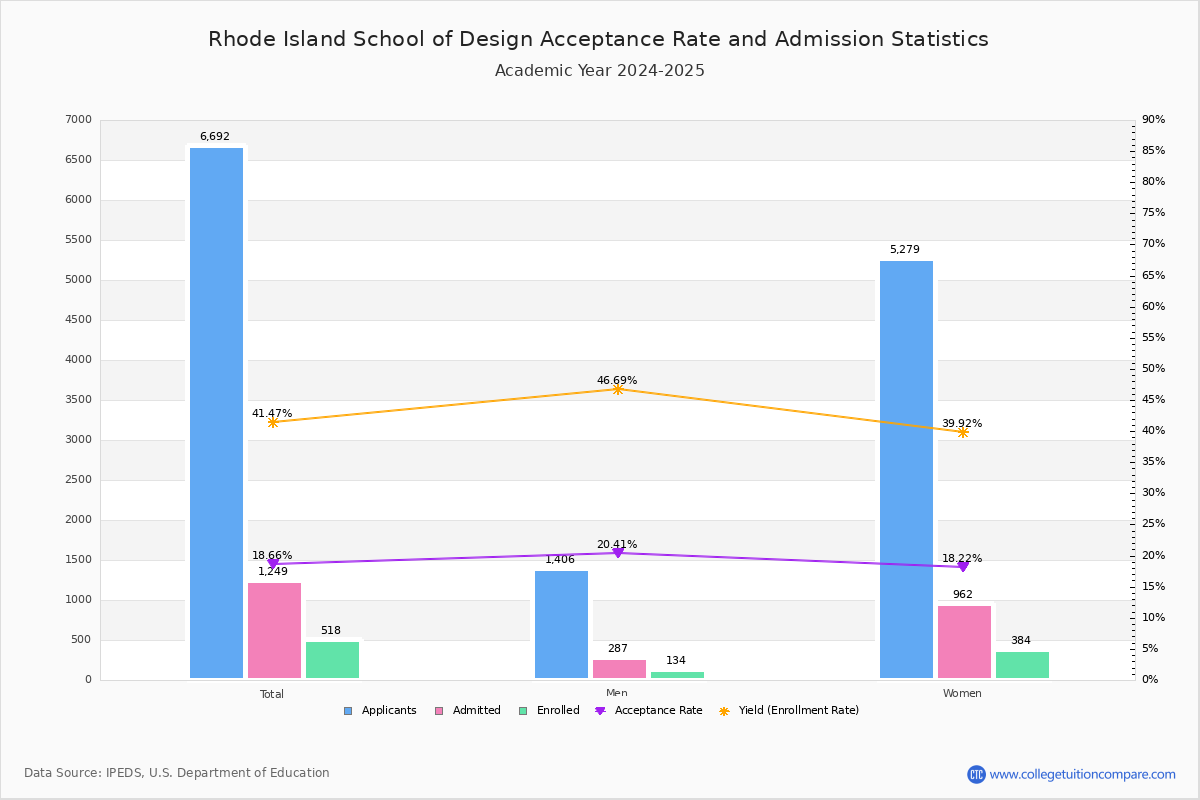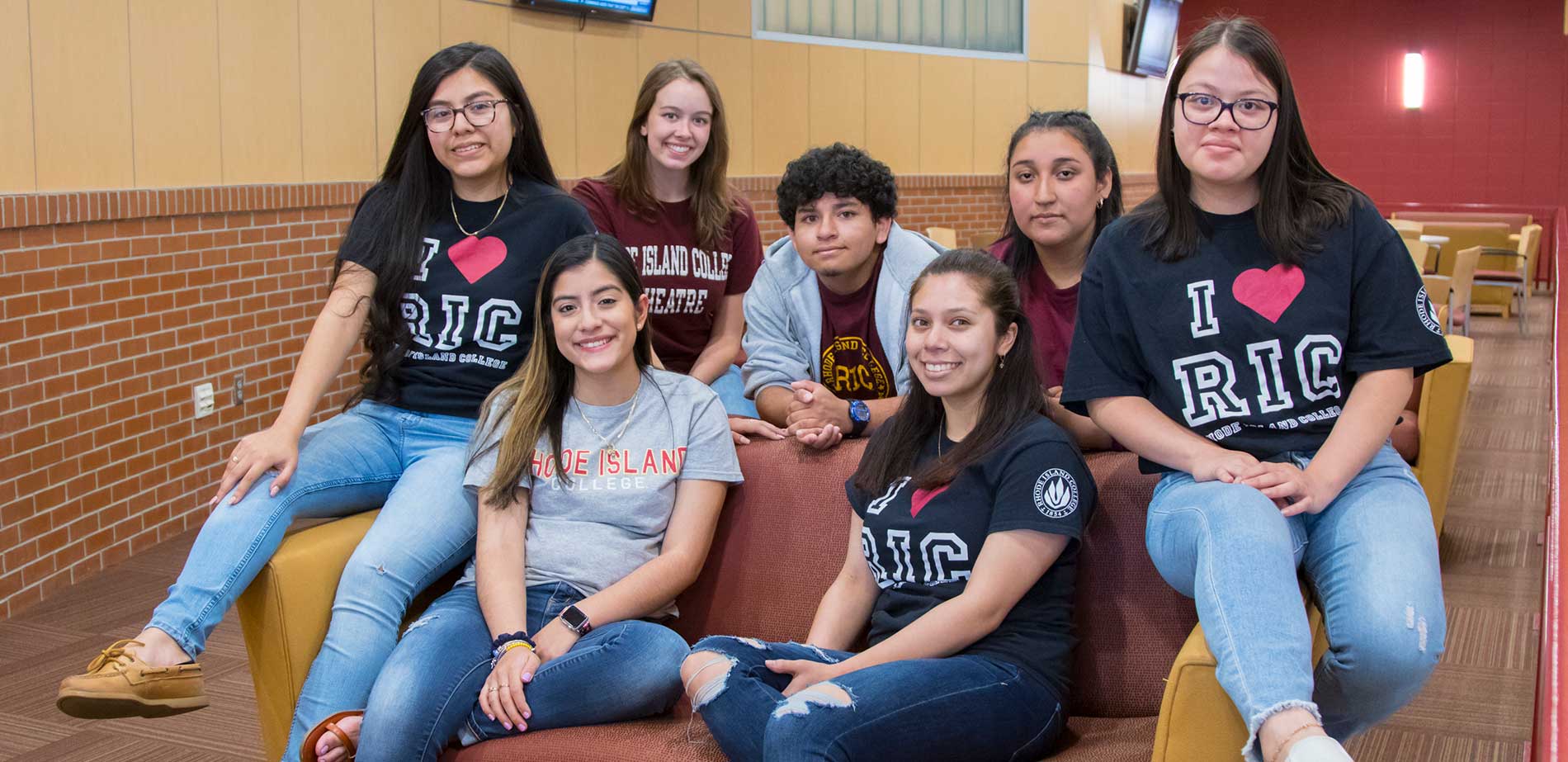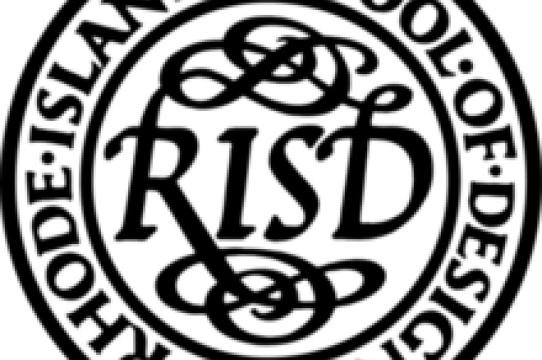Franklin offers more than 50 online bachelor's degrees, master's degrees and doctoral programs in the Scituate, area. Franklin University is an accredited nonprofit 4-year school where most students attend classes part-time. Most of the students are adults and most programs completed were offered online.
Bachelor's degrees are the most popular at Franklin University. In addition, 65 associate degrees, 599 master's degrees, and 8 doctoral degrees were earned. The Brown|RISD Dual Degree Program, among the most selective in the country, offered admission to 20 of the 725 applicants for the class entering in autumn 2020, for an acceptance rate of 2.7%. The program combines the complementary strengths of the two institutions, integrating studio art and design at RISD with Brown's academic offerings. Students are admitted to the Dual Degree Program for a course lasting five years and culminating in both the Bachelor of Arts (A.B.) or Bachelor of Science (Sc.B.) degree from Brown and the Bachelor of Fine Arts (B.F.A.) degree from RISD. Prospective students must apply to the two schools separately and be accepted by separate admissions committees.
Their application must then be approved by a third Brown|RISD joint committee. Salve Regina University was founded by Sisters of Mercy in Newport, Rhode Island in the Providence area. Accepting students from all walks of life and beliefs, the coeducational university aims to prepare students to seek wisdom, promote universal justice, and impart a love of learning. Considered one of the most beautiful colleges in the U.S., its oceanfront property sits on 80 acres of Gilded Age estates where students study and live together. Prospective students can apply to the school's 58 undergraduate and graduate programs, or 25 certificate programs. The school also offers over 200 study abroad programs in 45 countries.
With enrollment capping at approximately 2,000 students, class sizes are relatively small, with one professor teaching a group of about 20 students. Extracurricular activities include community service initiatives and a full athletics program. The backbone of Salve Regina University relies on Mercy values, integrating service, community, and spirituality into every element the university has to offer.
Rhode Island College is an accredited public 4-year school where most students attend classes full-time. Most of the students are of traditional age and no programs completed were offered online. Bachelor's degrees are the most popular at Rhode Island College. In addition, 0 associate degrees, 298 master's degrees, and 1 doctoral degree were earned. Located on a 180-acre campus in Providence, Rhode Island College is a comprehensive public college whose roots go back to 1854. The college represents a good value, especially for the 85% of students coming from in-state.
Providence has an active college scene --Providence Collegeis about a mile to the east, andRISDandBrownare about four miles away. Boston and New York City are easily accessed by train or interstate. On the academic front, RIC students can choose from roughly 90 majors and programs offered through the college's five schools. Professional fields such as business and education are extremely popular among undergraduates, as is the highly regarded nursing program.
Academics are supported by a 15 to 1 student / faculty ratio and an average class size of 24. For students in the selective Honors Program, the average class size is 15. In athletics, the Rhode Island College Anchormen and Anchorwomen compete in the NCAA Division III Little East Conference.
Whether you want to become a five-time Michelin star chef or a renowned fashion designer, Johnson & Wales University is a private career-oriented college with pathways to suit your tastes. Its leading programs offer degrees in arts and sciences, business, culinary arts, health, and wellness, among other fields. The school integrates work experience with leadership opportunities to inspire students in their chosen creative pursuits. For over 100 years, the university has blended experiential education in its courses, such as providing industry-specific labs with expertise from real company leaders. Over 50% of the university's students live on campus, with housing options ranging from suites to apartment-style living. Besides general extracurricular clubs and organizations, the school also hosts social events, including comedians, bands, world-class speakers, and varsity sports competing at the NCAA Division III level.
Bryant University is an accredited nonprofit 4-year school where most students attend classes full-time. Most of the students are of traditional age and minimal programs completed were offered online. In addition, 0 associate degrees, 212 master's degrees, and 0 doctoral degrees were earned. Johnson & Wales University-Online is an accredited nonprofit 4-year school where most students attend classes part-time. Most of the students are a mixture of traditional and adult aged and all programs completed were offered online.
Master's degrees are the most popular at Johnson & Wales University-Online. In addition, 1 associate degree, 198 bachelor's degrees, and 0 doctoral degrees were earned. Rhode Island School of Design is an accredited nonprofit 4-year school where most students attend classes full-time. Bachelor's degrees are the most popular at Rhode Island School of Design. In addition, 0 associate degrees, 205 master's degrees, and 0 doctoral degrees were earned.
Johnson & Wales University-Providence is an accredited nonprofit 4-year school where most students attend classes full-time. Bachelor's degrees are the most popular at Johnson & Wales University-Providence. In addition, 290 associate degrees, 236 master's degrees, and 14 doctoral degrees were earned. New England Institute of Technology is an accredited nonprofit 4-year school where most students attend classes full-time. Associate degrees are the most popular at New England Institute of Technology.
In addition, 301 bachelor's degrees, 67 master's degrees, and 7 doctoral degrees were earned. College Unbound is an accredited nonprofit 4-year school where most students attend classes full-time. Most of the students are adults and no programs completed were offered online. In addition, 0 associate degrees, 0 master's degrees, and 0 doctoral degrees were earned.
Providence College is an accredited nonprofit 4-year school where most students attend classes full-time. Bachelor's degrees are the most popular at Providence College. In addition, 1 associate degree, 232 master's degrees, and 0 doctoral degrees were earned.
Brown University is an accredited nonprofit 4-year school where most students attend classes full-time. In addition, 0 associate degrees, 733 master's degrees, and 354 doctoral degrees were earned. It has a total enrollment of 7,766 including undergraduate and graduate students and student to faculty ratio is 14 to 1. It is a Master's College and University school by Carnegie Classification and its highest degree is Doctor's degree - research/scholarship and professional practice.
The acceptance rate at Rhode Island College is 78.00% last year . Of the 12 schools near Scituate, 9 are four-year private colleges or universities where about 29,514 undergraduate students were enrolled. In 2020, a total of 11,737 degrees were completed at private colleges and universities, including 2,356 that were offered online. As a leading regional public college, Rhode Island College personalizes higher education of the finest quality for undergraduate and graduate students.
RIC offers vibrant programs in arts and sciences, business and professional disciplines within a supportive, respectful and diverse community. Dedicated faculty engage students in learning, research, and career attainment, and RIC's innovative curricula and co-curricula foster intellectual curiosity and prepare an educated citizenry for responsible leadership. Celebrating a rich history of economic and artistic development since the Industrial Revolution, the Rhode Island School of Design is one of the best colleges in RI for aspiring artists and designers. Unlike other selections of colleges listed here that offer more extensive degree programs, this school caters to creative minds who aim to strengthen their craft. The campus flourishes with venues full of opportunities for students to strengthen their interests, such as a nature lab and an art museum with rotating exhibits. Besides exploring the arts, food, and architecture of local culture to influence their design skills, students are encouraged to take part in typical intramural sports.
Approximately 2,500 students from around the world pursue their bachelor's and master's degrees in 21 art-related areas at this school. Non-students can also enjoy the benefits of joining the RISD Continuing Education program for non-credit courses, lectures, and workshops all year long. Providence College is the only college in the United States operated by Dominican Friars. The group is a province of preachers sharing the truth about God and opposing heresy. Dedicated to enriching spiritual life on campus, Providence College instills a tight-knit community with over 100 clubs and organizations for students to join. Undergraduates are required to complete the core curriculum, a two-year-long program studying the development of western civilization.
Overall majors and minors include 50 other degrees ranging from dance and theatre to social work and engineering. Students aspiring to expand their horizons beyond the United States can apply to the campus's selection of 300 study abroad programs. Students wanting to mix small-town living and big-city adventures will find a perfect combination of cultures at the University of Rhode Island. The main 1,200-acre campus known as Kingston Campus is located only 30 miles away from Providence and a short drive to Newport, Boston, and New York City. The other campuses spread out along the region of the coastal state.
These include a multidisciplinary campus, a nursing education center in downtown Providence, and a top-of-the-line graduate school of oceanography overlooking Narragansett Bay. Across the University of Rhode Island's sprawling locations, their degree program offers 80 undergraduate majors with 100 minors. Master's programs include the School of Education, the College of Business Administration and College of Engineering.
With almost 100 campus organizations and 20 fraternities and sororities, there is no shortage of opportunities for students to network and make the most out of college with their peers. Rhode Island College, with an acceptance rate of 75%, is largely open to interested applicants. Students with good grades and test scores are likely to get in. Prospective students will need to submit an application, SAT or ACT scores, and high school transcripts. For full requirements and guidelines, be sure to visit the school's website, tour the campus, or contact the admissions office at RIC. Candidates should be advised that certain programs, (e.g., art, teacher education, nursing and social work) have specialized requirements and admission standards that must be satisfied for acceptance into those programs.
The admissions policy at Rhode Island College is formulated by a committee of faculty, administrators and students. Generally, the most important factor in an admissions decision is the applicant's academic credentials. However, since the college recognizes the value of special backgrounds and experiences, it bases its final decision on the applicant's overall record. Additional factors considered include recommendations, academic potential, school and community activities, and—for certain applicants—standardized test scores. Applicants to Rhode Island College are expected to adhere to standards of academic honesty in completing the application process.
By signing the application, the applicant attests that the information provided is complete and accurate to the best of the applicant's knowledge. The admissions office may withdraw an application or rescind the acceptance offered, if a violation of academic honesty is discovered. Building a bridge between attending four-year universities and beginning vocational careers, the Community College of Rhode Island provides academic transfer programs and career-oriented training. Founded in 1964, this once modest college of 325 students now enrolls 18,000 students, offering services for full- and part-time students, recent high school graduates, and adult learners. It is Rhode Island's only public associate degree-granting institution.
Activities such as sports and clubs are limited compared to major universities. All students, faculty, and staff have free membership to the Rhode Island School of Design Museum of Art. For students embarking on their college journey for the first time, or continuing their education, Community College of Rhode Island is one of the best schools in Rhode Island. Offering programs to their College of Arts and Sciences and the College of Business, Bryant University contains limitless combinations of study with nearly 100 undergraduate and graduate courses available. Bryant University fosters an interdisciplinary combination of creative thinking and practical application into its curriculum, leading alumni to successfully intern and gain employment at the world's biggest corporations and organizations. From collaborating with non-profit organizations to engaging in dynamic coursework out of the classroom, students are prepared with real-world skills to succeed.
The campus includes multiple athletic centers, lecture halls, and community-building activities to create a close-knit community of friendly and values-driven relationships. Admittance remains competitive, with an average rate of 73% of students accepted into programs. The core values of academic training at Brown University are innovation and impact.
Founded in 1764, the prominent Ivy League research college remains one of the best colleges in Rhode Island for high-achieving individuals striving to make their mark. Answering the call to define and improve challenges the world is facing inspires community leaders to enter the complex fields of medicine, business, law, the arts, and more through Brown University. With an open curriculum, students are encouraged to create their own educational courses. The school's undergraduate and graduate programming instill the freedom to explore over 80 majors from Egyptology to medical research. Brown's Program in Liberal Medical Education remains one of the most prestigious courses in medical training in the U.S.
Rhode Island is a tiny state, yet 12 accredited colleges and universities fit within its borders — and the Rhode Island college list has something for everyone. Rhode Island College offers over 90 undergraduate and 30 graduate programs in business, nursing, social work, education, performing, and fine arts. Academic offerings of the college are organized into 5 schools and the Office of Professional Studies and Continuing Education. The college has also been accredited by the New England Commission of Higher Education and various other program-specific accreditations.
Rhode Island College is a public institution offering admissions in more than 90 undergraduate and 30 graduate academic programs at both undergraduate and graduate-level. With anacceptance rate of 73%,Rhode Island College is the least selective in its admissions. Out of the total 4,753 students admitted at the college, female applications summed up to 3,111 while the remaining are male applicants seeking to study in the USA. College Factual provides higher-education, college and university, degree, program, career, salary, and other helpful information to students, faculty, institutions, and other internet audiences.
Inclusion on this website does not imply or represent a direct relationship with the company, school, or brand. Information, though believed correct at time of publication, may not be correct, and no warranty is provided. Contact the schools to verify any information before relying on it. The displayed options may include sponsored or recommended results, not necessarily based on your preferences. The Community College of Rhode Island is the state's only public comprehensive associate degree-granting institution.
CCRI provides affordable open access to higher education at locations throughout the state. CCRI meets the wide-ranging educational needs of a diverse student population, building on a rich tradition of excellence in teaching and a dedication to all students with the ability and motivation to succeed. CCRI sets high academic standards necessary for transfer and career success, champions diversity, responds to community needs, and contributes to the state's economic development and the region's workforce. We encourage all applicants to take the most challenging courses they can comfortably handle.
Many successful applicants have taken some honors and/or AP/IB/dual enrollment courses, which can increase the likelihood of admission and/or scholarship and honors awarding. We also consider involvement and leadership in school and community, special talents and contributions, your essay, and your letters of recommendation. Your senior year course selection will also be a factor, so we advise you to continue to take challenging courses, including additional years of college-preparatory math, science, social science, foreign language, and humanities courses. +Students who have 18 units of college preparatory course work who attend high schools that do not offer foreign language may still be considered for admission.



























